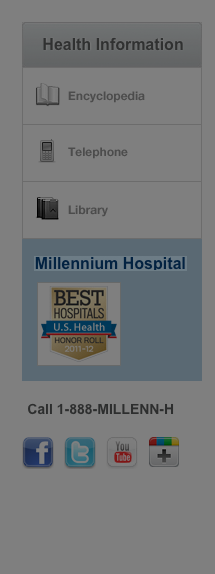Foxglove poisoning
 Print-Friendly
Print-Friendly
Willow-leaved foxglove poisoning; Revebjelle poisoning
Foxglove poisoning most often occurs from sucking the flowers or eating the seeds, stems, or leaves of the foxglove plant.
Poisoning may also occur from taking more than the recommended amounts of medicines made from foxglove.
This article is for information only. DO NOT use it to treat or manage an actual poison exposure. If you or someone you are with has an exposure, call your local emergency number (such as 911), or your local poison control center can be reached directly by calling the national toll-free Poison Help hotline (1-800-222-1222) from anywhere in the United States.
I Would Like to Learn About:
Poisonous Ingredient
Poisonous ingredients include:
- Deslanoside
- Digitoxin
- Digitalis glycoside
Where Found
The poisonous substances are found in:
- Flowers, leaves, stems, and seeds of the foxglove plant
- Heart medicine (digitalis glycoside)
Symptoms
Symptoms for the heart and blood include:
Other possible symptoms include:
- Blurred vision
- Confusion
- Depression
- Disorientation or hallucinations
- Halos around objects (yellow, green, white)
- Headache
- Lethargy
- Loss of appetite
- Rash or hives
- Stomach pain
- Vomiting, nausea, or diarrhea
- Weakness or drowsiness
Hallucinations, loss of appetite, and halos are most often seen in people who have been poisoned over a long period of time.
Home Care
Seek immediate medical help. DO NOT make a person throw up unless told to do so by poison control or a health care provider.
Before Calling Emergency
Get the following information:
- Person's age, weight, and condition
- Name of the plant or medicine, if known
- Time it was swallowed
- Amount swallowed
Poison Control
Your local poison control center can be reached directly by calling the national toll-free Poison Help hotline (1-800-222-1222) from anywhere in the United States. This national hotline will let you talk to experts in poisoning. They will give you further instructions.
This is a free and confidential service. All local poison control centers in the United States use this national number. You should call if you have any questions about poisoning or poison prevention. It does not need to be an emergency. You can call for any reason, 24 hours a day, 7 days a week.
What to Expect at the Emergency Room
The provider will measure and monitor the person's vital signs, including temperature, pulse, breathing rate, and blood pressure. Symptoms will be treated as appropriate. The person may receive:
- Activated charcoal
- Blood and urine tests
- Breathing support, including oxygen through a tube through the mouth into the lungs, and a breathing machine (ventilator)
- Chest x-ray
- ECG (electrocardiogram or heart tracing)
- Fluids through a vein (IV)
- Laxatives
- Medicines to treat symptoms, possibly including an antidote to help reverse the effects of the poison
Outlook (Prognosis)
How well you do depends on the amount of poison swallowed and how quickly treatment is received. The faster you get medical help, the better the chance for recovery.
Symptoms last for 1 to 3 days and may require a hospital stay. Death is unlikely.
DO NOT touch or eat any plant with which you are not familiar. Wash your hands after working in the garden or walking in the woods.
Related Information
References
Graeme KA. Toxic plant ingestions. In: Auerbach PS, Cushing TA, Harris NS, eds. Auerbach's Wilderness Medicine. 7th ed. Philadelphia, PA: Elsevier; 2017:chap 65.
Lim CS, Aks SE. Plants, herbal medications, and mushrooms. In: Walls RM, ed. Rosen's Emergency Medicine: Concepts and Clinical Practice. 10th ed. Philadelphia, PA: Elsevier; 2023:chap 153.
Theobald JL, Kostic MA. Poisoning. In: Kliegman RM, St. Geme JW, Blum NJ, Shah SS, Tasker RC, Wilson KM, eds. Nelson Textbook of Pediatrics. 21st ed. Philadelphia, PA: Elsevier; 2020:chap 77.












